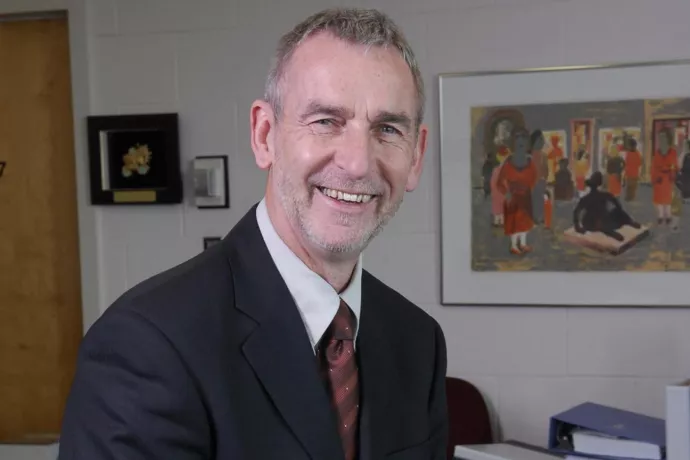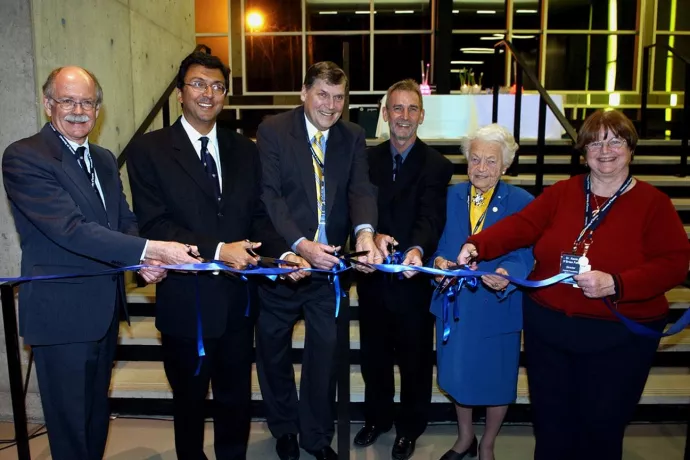
UTM to honour former principal Ian Orchard, other noteworthy campus champions at Alumni Awards of Distinction
At U of T Mississauga, few individuals have made as much of an impact on the institution’s growth and success than the recipient of this year’s Paul W. Fox Award, accomplished biology researcher and distinguished top administrator Ian Orchard.
Eponymously named after UTM’s principal from 1976-1986, the award recognizes a community member’s dedication to improving campus life, and is a fitting tribute to Orchard, a talented, passionate leader who, as vice-president and principal from 2002 to 2010, shepherded UTM’s evolution into a more independent, modern and vibrant destination for obtaining an education, conducting research and building community partnerships.
“I'm honoured to receive the Paul Fox Award, but really, I’m just continuing, I think, what previous principals had done,” says Orchard, who will accept the honour at the Alumni Awards of Distinction on Oct. 26. “No one does this alone. We had the right team that could enable our progress, and so I share this award with a number of the team members from that era.”
This sounds like classic British modesty from Orchard, a transplant from England who first joined U of T in 1982 as a professor in Zoology at the St. George Campus. Every team needs a leader who can build consensus and inspire purposeful action, and Orchard brought those qualities and more to multiple administrative positions at the downtown campus, first in the Faculty of Arts & Science as associate dean (1993-97) and then vice-dean (1997-98), then as vice-provost of students. When he joined what was then Erindale College in 2002, it was a pivotal time: under U of T’s new tri-campus system, UTM shed its governance by the Faculty of Arts & Science and transformed into a semi-autonomous educational entity with its own academic units and administrative structure.
“When I arrived in 2002, we knew we were going to go through a rapid period of growth partly brought about by UTM’s shift into a distinct U of T division, the double cohort [when Ontario eliminated OAC, formerly Grade 13, in 2003, creating two simultaneous cohorts of first-year post-secondary students], and a demographic change where more people wanted to go to university,” Orchard recalls. “So there was an opportunity to really develop UTM into a much larger and more efficient campus that could accommodate a critical mass of students and faculty, and enable more research activity.”

With Orchard’s ambitious vision and skillful guidance, the campus expanded in both population and physical size, doubling enrolment and constructing new facilities valued at $250 million. Among the buildings that rose during Orchard’s tenure were the Hazel McCallion Academic Learning Centre, U of T’s first LEED-certified building; the state-of-the-art Recreation, Athletics and Wellness Centre; and the Communication, Culture and Technology Building, home to a 500-seat lecture theatre (UTM’s largest), a multimedia studio theatre and 24-hour computer labs, and the recipient of the Governor General’s Medal in Architecture.
Orchard also prioritized expanding UTM’s presence in the City of Mississauga and building strategic community partnerships. It was the productive relationships the campus formed with Trillium Health Partners hospitals that enabled the creation in 2011 of UTM’s Mississauga Academy of Medicine, which today offers 216 learners a variety of clinical and academic training sites. UTM also joined with Mississauga, Peel Region, the United Way, the Dufferin-Peel Catholic District School Board, AstraZeneca and other area decision-making organizations to create the Healthy Cities Stewardship Centre, an award-winning model for promoting local residents’ physical, mental and spiritual health.
“I think the Healthy Cities initiative illustrated the importance of us linking to the community, as well as how the community benefits from having UTM in its backyard,” says Orchard, who returned in 2019 to lead the campus for one year when then-principal Ulrich Krull took medical leave. Orchard orchestrated UTM’s initial response to the onset of the COVID-19 pandemic.
Over the years, Orchard has continued his work as an academic, leading and supervising studies on the neuroendocrinology of insects that have altogether been cited more than 9,400 times. He has also actively supported the inspiring projects of students through the Ian Orchard Student Initiative Fund for undergraduates – created in his name by UTM – and by establishing, together with his work and life partner, the Angela B. Lang and Ian Orchard Graduate Student Initiatives Fund. Along the way, U of T named Orchard a Distinguished University Professor in 2011, while in 2013, he received UTM’s Research Excellence Award.
At the Alumni Awards of Distinction, Orchard will be joined by two other honourees. Ivana Di Millo (BA 1988 UTM), the principal and managing director of Blue Opal Communications, will receive the J. Tuzo Wilson Distinguished Alumni Award. Eugenia Duodu Addy (HBSc 2010 UTM, PhD 2015 U of T), the CEO of STEM-focused charity Vision of Science Network for Learning, will receive the Desmond Parker Outstanding Young Alumni Award.
